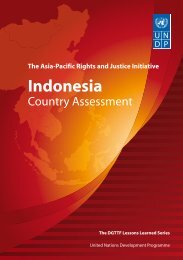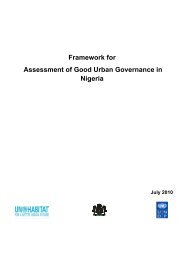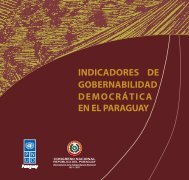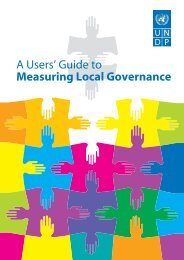English - UNDP
English - UNDP
English - UNDP
Create successful ePaper yourself
Turn your PDF publications into a flip-book with our unique Google optimized e-Paper software.
Local Governance and Decentralization<br />
committees in following up on the training, and for backstopping<br />
the activities.<br />
The project management structure ensured efficient<br />
implementation, with all results produced within the<br />
proposed timeframe. In addition, it enabled swift integration<br />
of achievements into the Communities Programme.<br />
Innovation<br />
The project introduced a new implementation approach to<br />
planning and budgeting in Tajikistan. This was elaborated in<br />
the methodology for planning, budgeting, and monitoring<br />
and evaluation at district and jamoat levels. At the same time,<br />
the project supported a new planning and budgeting practice.<br />
For the first time in Tajikistan, this integrated and coordinated<br />
national (horizontal), and district and jamoats (vertical) planning<br />
and budgeting processes.<br />
The project tested an innovative model in capacity development,<br />
which consisted of a well-balanced combination of training and<br />
mentoring. Learning by doing with the support of experienced<br />
peers proved an excellent tool for improving performance.<br />
In terms of innovation, the project enabled the Communities<br />
Programme to expand the scope of its intervention into a new<br />
area, reform of public administration.<br />
Catalytic effect<br />
The project expanded the scope of the Communities Programme<br />
to public administration reform, and built on the quality and<br />
impact of past interventions. It strengthened <strong>UNDP</strong>’s presence<br />
at the national level and enhanced partnerships with the key<br />
national institutions.<br />
The project supported the development of the methodology<br />
for planning, budgeting and monitoring and evaluation at<br />
district and jamoat levels. This methodology was endorsed by<br />
the government and adopted as the official, national policy for<br />
planning and budgeting at district and jamoat levels.<br />
Although the policy framework was adopted, the issue of scarce<br />
capacities for its implementation remained evident. Therefore,<br />
after positive experience with DGTTF-funded activities and initial<br />
success in implementation of planning, budgeting, monitoring<br />
and evaluation in pilot districts, the project (including the<br />
project team) was institutionalized in the Ministry of Economic<br />
Development and Trade. The initial DGTTF project was followed<br />
up with a larger (US$3 million) <strong>UNDP</strong> project, financed from<br />
<strong>UNDP</strong>’s core resources. Within the framework of this larger<br />
project, <strong>UNDP</strong> in partnership with the Ministry of Economic<br />
Development and Trade expanded activities throughout the<br />
country by providing technical assistance to implement the<br />
new planning and budgeting model.<br />
Sustainability<br />
Engaging regional authorities and national actors into a standard<br />
participatory planning methodology was deemed an absolute<br />
priority. The sustainability of methodology for preparation of<br />
district development plans was strongly supported by the<br />
key national institutions (including the Ministry of Finance,<br />
the Ministry of Economic Development and Trade, and the<br />
Strategic Research Centre under the President), resulting in its<br />
adoption as the national platform for planning at district level.<br />
Implementing the participatory planning and budgeting<br />
methodology has experienced some limitations, such as the<br />
lack of financial resources (especially the unpredictable transfers<br />
from the central level), insufficient links to sectoral programmes<br />
and reforms, the State Mid-Term Expenditure Framework, the<br />
ongoing public administration reform, and the overall discussion<br />
over decentralization of responsibilities and fiscal powers.<br />
The sustainability of training programmes on strategic planning,<br />
participatory budgeting, poverty mapping, and monitoring was<br />
ensured by their use by the Institute for Civil Service Training as<br />
its regular curricula for civil servants’ professional advancement.<br />
It is supported from the national budget and is an ongoing<br />
activity of the centre.<br />
Gender<br />
Gender indicators were not included at the project design stage,<br />
so gender mainstreaming was difficult to assess. Therefore, an<br />
analysis of the gender dimension within this project was done<br />
indirectly, reviewing activities and processes, and analysing<br />
outputs.<br />
Gender mainstreaming was addressed indirectly. The training<br />
delivery reports show that all training sessions had an equal<br />
number of women and men.<br />
It is difficult to know whether gender mainstreaming was<br />
considered during the design of the methodology for preparation<br />
of district development plans. Nevertheless, during the review<br />
it was confirmed that the Ministry of Economic Development<br />
and Trade was working with local authorities to update the<br />
methodology to consider cross-cutting issues, including gender.<br />
22




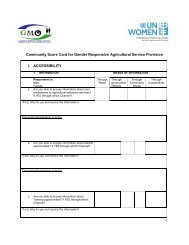

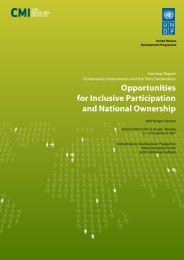
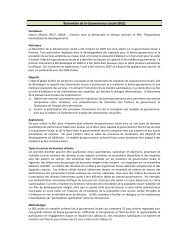
![GuÃa del Usuario ] - Governance Assessment Portal](https://img.yumpu.com/44740603/1/190x253/gua-a-del-usuario-governance-assessment-portal.jpg?quality=85)
